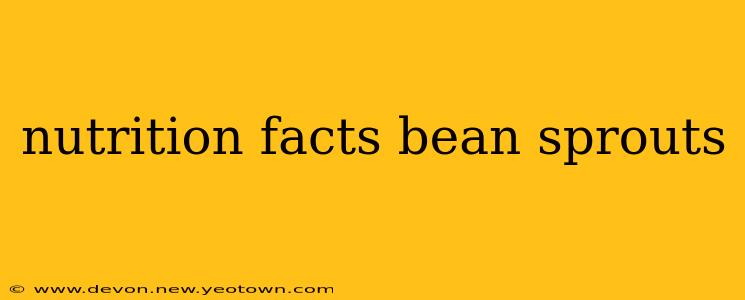Bean sprouts. Those delicate, crunchy little things often tossed into salads, stir-fries, or enjoyed as a side dish. But have you ever stopped to consider the nutritional powerhouse packed within their seemingly simple structure? Let's delve into the world of bean sprouts and uncover the surprising nutritional facts that make them a healthy addition to any diet.
My journey into the world of bean sprouts started with a simple question: Are they really as healthy as people say? This led me down a rabbit hole of research, uncovering fascinating details about their nutritional profile and health benefits. I'm sharing my findings with you today, hoping to enlighten you on this often-underestimated superfood.
What are Bean Sprouts?
Before we dive into the nutritional details, let's briefly clarify what bean sprouts are. They're essentially the sprouted seeds of various beans and legumes, most commonly mung beans, soy beans, and alfalfa. The sprouting process involves soaking the seeds in water, allowing them to germinate and develop tiny roots and shoots. This process significantly alters the nutritional composition, enhancing the nutritional value compared to the unsprouted seeds.
What are the nutritional benefits of bean sprouts?
This is a question I frequently encounter. The answer, thankfully, is quite comprehensive. Bean sprouts are surprisingly rich in various essential nutrients. They are a fantastic source of:
-
Vitamins: Bean sprouts are packed with vitamins, particularly Vitamin C, which is an antioxidant vital for immune function. They also contain good amounts of Vitamin K, important for blood clotting, and several B vitamins crucial for energy metabolism.
-
Minerals: These little sprouts are also a good source of various minerals. Manganese, an essential mineral for bone health and metabolism, is present in substantial amounts. Iron, crucial for oxygen transport, is another notable mineral found in bean sprouts.
-
Fiber: The fiber content in bean sprouts is another significant plus. Fiber aids digestion, promotes gut health, and helps regulate blood sugar levels. This makes them a great addition to a balanced diet for digestive well-being.
-
Protein: While not as protein-dense as some other legumes, bean sprouts still contribute a decent amount of protein to your diet, crucial for building and repairing tissues.
How many calories are in bean sprouts?
This is a frequently asked question, especially for those watching their calorie intake. A typical serving (around 100g) of bean sprouts contains roughly 30 calories. This low-calorie content makes them a guilt-free addition to your meals, contributing to a healthy and balanced diet without significantly impacting calorie counts.
Are bean sprouts good for weight loss?
The low calorie count, combined with their high fiber and nutrient content, makes bean sprouts a potential asset in weight management strategies. The fiber helps you feel full for longer, reducing overall calorie intake, and the nutrients support overall health. However, they are not a magic bullet; weight loss depends on a holistic approach involving a balanced diet and regular exercise.
What are the potential downsides of eating bean sprouts?
While generally safe and healthy, there are a few potential downsides to consider. Poorly handled or stored bean sprouts can harbor harmful bacteria like Salmonella or E. coli. It's crucial to purchase them from reputable sources and ensure proper refrigeration and handling at home. Additionally, some individuals might experience mild digestive discomfort due to the fiber content.
Are there different types of bean sprouts, and how do their nutritional values differ?
Yes! The nutritional composition varies slightly depending on the type of bean or legume used to produce the sprouts. Mung bean sprouts are perhaps the most common, followed by soy bean sprouts and alfalfa sprouts. While the overall nutritional profile remains largely similar, the precise amounts of vitamins, minerals, and other compounds can differ. For example, alfalfa sprouts are known for higher Vitamin K content.
In conclusion, bean sprouts are a humble yet incredibly nutritious food. Their low calorie count, high fiber content, and impressive array of vitamins and minerals make them a valuable addition to a healthy diet. Remember to choose your sprouts from reputable sources and handle them carefully to minimize potential risks. Incorporating bean sprouts into your diet is a simple yet effective step towards better health and well-being.

